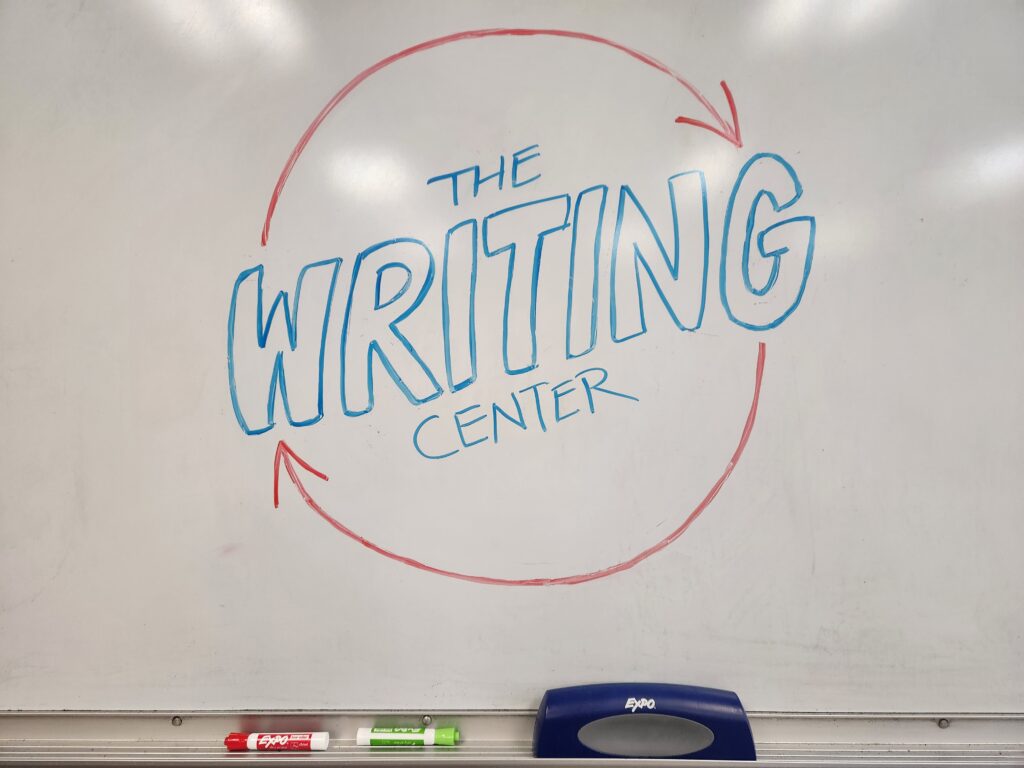Jannette Emmerick
Sometimes, words are hard. Especially when they need to be written down and communicate your thoughts effectively for professional and academic purposes.
This is why the Writing Center exists and strives to help students with any kind of scribal need whether that be essays, discussion posts, emails, letters or resumes.
“The main focus, for me anyways, is trying to get students to come here and utilize the space, to learn to write better in a way that’s not anxiety inducing,” said Dr. Melanie Jordan, Faculty Coordinator for the Writing center as well as a senior lecturer in the Department of General Education.
“Everyone is anxious about writing,” continued Jordan. “Even people who love it are still anxious about it. So I’m trying to remember that goal about ‘Writing’ with a capital ‘W.’”
Now located in Boyd 203, the Writing Center has a new space and a new administrative structure to more effectively serve the UWG community.
“It’s not so much that we need you to be able to write, so that you can pass your essay. It’s about writing in general,” said Alexander Hovanec, Administrative Assistant for the Writing Center who coordinates appointments and manages the Center’s social media among other tasks.
“We want to cultivate a space where you can learn to find your voice and get it down on paper,” continued Havonec. “We’ve got a grab bag of tutors, so we want to meet writers at any level they’re at. At any comfort level, any scholastic level, anything like that.”
Contrary to what some may believe, the Writing Center helps with more than just English and literature classes. They are equipped to help with any subject whether that be biology or sociology. They even offer help with scholarship applications and anything else involving writing.
“Writing can be an exercise in code-switching,” said Havonec. “And what I mean by that is, you can send text-speak and still be eloquent as all get out with what you’re communicating and completely coherent.
“In the Writing Center and the academia at large, it’s not so much us trying to stamp out dialect or casual conversation speech, but also trying to teach students how to switch into writing for a business or collegiate level,” continued Havonec.
In recent years, literacy rates have been a concern within U.S. education. While a viable worry, the understanding of what literacy means is under debate. It’s not about the technicalities of writing with grammar, punctuation, and spelling, but is about the reader understanding what they have read and the writer understanding how to communicate their ideas effectively.
“One of the things we’re good at in terms of literacy is if a student wants help, we sit and say, ‘okay, you read this, you saw this document. What do you think?’” said Jordan. “And while we don’t change what they think, it’s like we sit to say, ‘but what about this?’”
For the Writing Center, it’s about helping the student express their thoughts coherently despite dialect or small mistakes in writing. The importance comes from understanding and communicating.
While the Writing Center employs several students and grad students as peer tutors—or consultants, as Jordan prefers to call them—a majority of Writing Center consultants are faculty from the Department of General Education.
“It’s one of the things that really distinguishes us from other centers and other organizations is when you’re talking to someone about your writing, you’re actually talking to a professional,” said Jordan.
Jordan and Hovanec work to not only encourage students to utilize the Writing Center as a resource, but to also connect with the community. Though they don’t have anything big planned, they hope to adjust and outreach more with the community through partnerships and events.
Even if students are confident in their writing abilities, the Writing Center offers a great place for double checking and walking through edits one-on-one. In the end, writing is a skill that can be honed.
“[Writing is] something that you can definitely learn,” said Havonec. “No one is a lost cause. You know,if you want to write something creative, come in. If you think you’re a good writer, come in. There’s always room to improve. And that goes for us as well. I just learned how to write a poem two weeks ago.”
